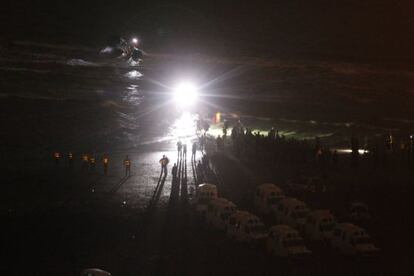Spain and Morocco remove sub-Saharan immigrants from Isla de Tierra
The Civil Guard takes dozens of would-be migrants off tiny Spanish island Sub-Saharans handed over to Moroccan authorities under terms of bilateral agreement

The Moroccan and Spanish authorities took action late on Monday night to remove a group of around 70 sub-Saharan would-be immigrants from the islet of Isla de Tierra, where they had assembled with the hope of making it to mainland Europe.
The sub-Saharans were taken by motorboat to the Moroccan beach of Sfiha, where a large force of Moroccan soldiers, police officers and gendarmes were waiting for them.
An hour before, a helicopter had landed on the neighboring Peñón de Alhucemas, which also belongs to Spain. That was where the joint operation between Morocco and Spain began to break up the improvised camp of 71 would-be immigrants on Isla de Tierra, a tiny, uninhabited Spanish islet located 50 meters off the Moroccan coast and around 120 kilometers east of Melilla.
The authorities made a series of trips between the island and the beach, although the boats stopped short of the actual shore, with the immigrants having to walk the last 20 or 30 meters in the water. In many cases they were handcuffed. The Spanish officers, however, did not actually reach Moroccan land, handing over the undocumented migrants to the Moroccan gendarmes in the sea.
Sources say that Civil Guard officers used torches to seek out immigrants who were trying to hide
While journalists were only able to watch the scene unfold from afar, it was clear that agents – Civil Guard officers, according to Spanish and Moroccan sources – were using torches to seek out immigrants who were trying to hide.
The operation was complete by 4.30am on Tuesday morning, and the islet was left deserted. Later on all that was visible was a tent and a handful of soldiers cleaning up the area.
Moroccan police sources confirmed that the final destination of the immigrants will be Algeria. Given that they were located on Spanish soil, it was Spain that took charge of forcibly removing them from the island. But they were then immediately handed over to Moroccan authorities.
The two countries agreed on this approach based on a bilateral agreement regarding the readmission of irregular immigrants that has been in place since 1992. That agreement has been used on a number of occasions, such as in 2005, when Spain handed over 73 undocumented migrants to Morocco after they managed to force their way into the Spanish exclave of Melilla.
The eight minors and two mothers who were found on Isla de Tierra were taken to Melilla, where they received medical attention, according to news agency Efe.
The 10 immigrants, who were considered to be the most vulnerable, were initially taken to the Peñón de Alhucemas, before being transferred to the city by helicopter.
Tu suscripción se está usando en otro dispositivo
¿Quieres añadir otro usuario a tu suscripción?
Si continúas leyendo en este dispositivo, no se podrá leer en el otro.
FlechaTu suscripción se está usando en otro dispositivo y solo puedes acceder a EL PAÍS desde un dispositivo a la vez.
Si quieres compartir tu cuenta, cambia tu suscripción a la modalidad Premium, así podrás añadir otro usuario. Cada uno accederá con su propia cuenta de email, lo que os permitirá personalizar vuestra experiencia en EL PAÍS.
¿Tienes una suscripción de empresa? Accede aquí para contratar más cuentas.
En el caso de no saber quién está usando tu cuenta, te recomendamos cambiar tu contraseña aquí.
Si decides continuar compartiendo tu cuenta, este mensaje se mostrará en tu dispositivo y en el de la otra persona que está usando tu cuenta de forma indefinida, afectando a tu experiencia de lectura. Puedes consultar aquí los términos y condiciones de la suscripción digital.








































